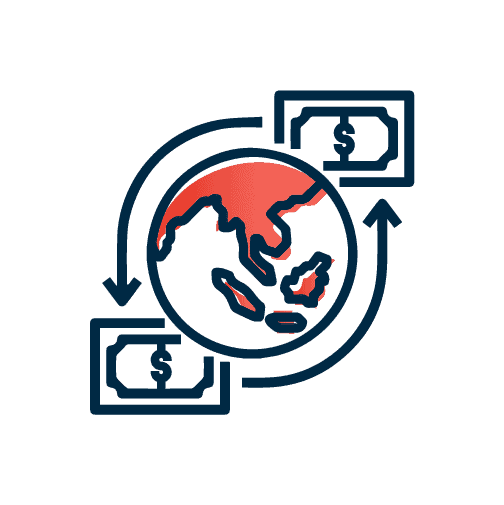AVPN Impact Investing Fellowship
Innovative ideas and practical applications for impact practitioners
AVPN Academy, in partnership with the ESADE Business School’s Centre for Social Impact, is offering a fellowship programme that seeks to help practitioners gain deeper understanding of how impact investing approaches can help address societal challenges.
DateS
26 July 2024 – Induction and kickoff event (virtual)
31 July to 2 Aug 2024 – Learning (in-person)
27 and 29 August 2024 – Learning (virtual)
PROGRAMME FEES
USD 2,000 for AVPN members
USD 3,000 for non-members
No additional cost for Suite Pass Subscribers
Registrations closes in mid-July 2024. Successful registrants will be notified via email.
overview
Be an AVPN Impact Investing Fellow
Impact Investing and Venture Philanthropy are investment approaches that seek a societal impact combined with different degrees of financial return. Impact investing uses innovative financing mechanisms, capacity building support and impact measurement and management.
The course strives to be eminently practical and applicable to a variety of contexts. For this reason, we will analyze cases referring to different types of investment opportunities and impact investors, in different sectors and continents, addressing varied challenges in various ways, and exploring the investment strategy and process of an impact investing fund.
Participants are not required to have a background in finance – indeed the focus will be on the impact side rather than the financial side of impact investing.
This is a hybrid programme involving a mix of virtual sessions and an in-person convening in Japan, where fellows will also have the opportunity to connect with each other and impact practitioners from around the globe.
The programme is led by lead facilitator: Dr. Lisa Hehenberger, an Associate Professor at the ESADE Business School and Founding Director of its Center for Social Impact, and features leading Impact Practitioners based in Asia as guest speakers.
Successful registrants will be notified via email.
WHO
Who should join
This course is designed for a broad range of participants:
- Impact Investors
- Organisations/Financial sector new to impact investing
- Foundations and Banks looking to develop their impact investing practices
- Foundations, Family Offices and Philanthropists interested in incorporating an impact investment lens to their work
- Development Finance Institutions and Government Investment Companies interested in moving into the growing impact investing space

WHAT
Programme key themes



Develop their competences in terms of defining an impact thesis and how to make an investment selection based on that
Consider how to generate and measure social impact
Understand the everyday practices of impact investing funds


Gain practice on making investment decision, including the sourcing and selection of opportunities and the structuring of deals
Be able to reflect about how impact investing approaches can help address societal challenges
Programme benefits



Networking, Partnership, and Collaboration Opportunities among Leading Impact Investors in Asia, Europe, and beyond
Executive Education with a
Certificate of Attendance
Leadership Development and
Strategic Thinking
THE FACILITATORS
Meet the faculty

Dr. Lisa Hehenberger
Associate Professor
ESADE Business School
Dr. Lisa Hehenberger is an Associate Professor at ESADE Business School and Founding Director of its Center for Social Impact. She teaches courses on social entrepreneurship and impact investing, impact measurement and management in ESADE’s Masters and MBA programs as well as executive programs. She is a renowned expert on social entrepreneurship, venture philanthropy, impact investment, and impact measurement.
She is actively contributing to building the social impact field through her participation in expert groups set up by the European Commission, the OECD and the G8 and through advisory board seats in impact funds and foundations. Notably she is the Chief Impact Advisor of Oryx Impact, Impact Advisor to Blackrock, a member of the Board of Directors of the GSMA Foundation, and sits on the impact committees of Rubio Impact Ventures and Suma Capital.
She is on the Scientific Board of the OECD Global Action “Promoting Social and Solidarity Economy Ecosystems” and is a member of CNBC’s Disruptor 50 Advisory Council, a group of leading thinkers in the field of innovation and entrepreneurship. For six years, she was the Research and Policy Director of the European Venture Philanthropy Association (EVPA), the pan-European association for venture philanthropy and social impact investment. She is the academic partner of the Spanish National Advisory Board on Impact Investing (Spain NAB) and served on the French National Advisory Board and the Impact Measurement Working Group of the Social Impact Investment Task Force established by the G8 (now GSG).

Wai Chiew Chik
CEO and Executive Director Heritas Capital Management Pte. Ltd.
Wai Chiew has over 25 years of experience in global investment management and strategic business development, actively leading various companies on transformational growth strategies, fundraising and M&A. In his previous roles at Temasek and other funds, he has led and managed investments across multiple industries and geographies, deploying capital for institutions as well as multiple family offices.
Since joining Heritas Capital, Wai Chiew has expanded its private equity investment portfolio and initiated venture capital, fund-of-funds, and impact-first investments into healthcare, education, environment, and technology sectors globally. In line with Heritas’ “invest with purpose, impact across generations” investment philosophy, he has overseen the integration of Environmental, Social and Governance (ESG) considerations and impact investment mandates while building up Heritas’ multi-fund impact investment platform.
Wai Chiew was awarded the Glaxo-EDB scholarship and holds a BA in Economics from University of Cambridge, UK; MA from Yale University, USA; and completed his EMBA (conducted in Mandarin) from Cheung Kong Graduate School of Business, China. He has served as Honorary Treasurer with the Singapore Venture Capital and Private Equity Association (SVCA), and currently serves as a member of its ESG committee. Wai Chiew also actively serves as a director on multiple boards to advocate sustainable growth and sound governance.

Dr. Arnil Paras
Head
AVPN Academy
Dr. Arnil Paras is the head of AVPN Academy, the main learning and educational platform of AVPN for its members and the wider ecosystem of social investors.
In this capacity, Arnil and his team designs and delivers learning experiences that capacitate and grow the community of social investors in Asia through peer-to-peer and practitioner-relevant knowledge sharing. Under his stewardship, the Academy has developed different learning formats, including learning circles for corporate social impact leaders, case-based learning series for social finance practitioners, fellowship programmes on gender-lens investing and philanthropy.
Prior to joining the Academy, Arnil was an professor at the Asian Institute of Management where he taught courses for MBA and Executive MBA students, and was the director of the Master of Development Management. He holds graduate degrees from the London School of Economics and the University of Asia and the Pacific and a PhD in Public Policy from the City University of Hong Kong.
Faculty list will be updated with experts and leading impact investors as guest speakers
agenda
Fellowship programme
26 JULY 2024
1 HOUR
Induction and Kickoff Event
Join Academy
31 JULY TO 2 AUGUST 2024
IN-PERSON CONVENING
3 DAYS
Connect with other fellows from different parts of the world with a three-day in-person convening to be held in Tokyo, Japan.
Identifying Gaps to Maximise Impact
We will define impact investing and its place in the investment spectrum. Impact investors seek to generate social and environmental impacts in addition to financial returns. This emerging investment strategy is developing around the globe as a way to expand the ability of social enterprises to scale their impacts on critical issues such as energy, water, climate change, community development, health, sustainable development and education. It includes venture capital, private equity, debt and specific kinds of philanthropic investment tools.
Impact Measurement and Theory of Change
Impact investors need to understand what impact is and how it is measured. We will go through some theory, including the main frameworks used by impact investors, and then work through the steps of developing a theory of change for a social enterprise.
Developing an Impact Thesis
We will learn about different ways of setting up a fund, the components of an investment strategy, and how to develop an impact thesis. What distinguishes an impact investment fund from a regular venture capital/private equity fund is the impact thesis. In this workshop we will look at how to develop the impact thesis (from a theory of change) and how to embed impact into the investment strategy of a fund.
The Investment Process: From Deal Screening to Investment Decision
We will go through the various stages in the investment process and how to consider impact. Through a business school case study, we will discuss the different considerations related to selecting an investment opportunity and consider tools to conduct due diligence.
Financial Instruments and Non-Financial Support
Impact investors employ a range of financing instruments and support their investees also non-financially. We will discuss the different financing instruments employed by impact investors and then conduct a workshop on the different ways that impact investors can best tailor their resources to the needs of the investees.
Portfolio Management and Exit
Once the investments are made, the impact investor needs to oversee the portfolio, making sure the companies are growing both financially and in terms of impact. We will discuss the main elements to keep in mind and how to prepare portfolio companies for a successful exit.
Join Academy
27 AUGUST 2024
3 HOURS
Virtual Live Modules – Day 1 of 2
Consolidate learnings from the in-person workshop with practical exercises:
- Guest lectures with Impact Investing Practitioners based in Asia
- Formulate Action Plans on implementing learnings in organizations
Join Academy
29 AUGUST 2024
3 HOURS
Virtual Live Modules – Day 2 of 2
Consolidate learnings from the in-person workshop with practical exercises:
- Guest lectures with Impact Investing Practitioners based in Asia
- Formulate Action Plans on implementing learnings in organizations
Join Academy
Important Note: Dates and curriculum may be subject to minor revisions
Frequently Asked Questions
Applications will run from May 2024. Successful applicants will be notified via email.
The programme will start with a one-hour virtual kickoff and induction event on 26 July 2024, Friday.
The time commitment consists of 7 hours of virtual learning, and three days for the in-person convening.
- Kickoff and Induction Event – 1 hour
- In-person Convening – 3 days
- Virtual Modules – 6 hours (3 hours x 2 days)
The registration cost is USD 2,000 for AVPN members and USD 3,000 for non-AVPN members. Suite Pass subscribers don’t need to pay any extra fees to participate.
Please note that flight and accommodation costs for the in-person convening in Tokyo will be covered by the participant.
There will be no refunds. Please make sure your schedule will allow you to participate for the full duration.
The AVPN Academy Suite Pass is a subscription-based learning journey that will deepen your understanding, enhance your practice, and broaden your network in the philanthropy, impact investing, and the wider social investing space.
For more information on the Suite Pass, please visit: https://academy.avpn.asia/suite-pass/
Join Academy
Learn with AVPN
Unlock your impact potential by building your social investment skillset at the AVPN Academy.









